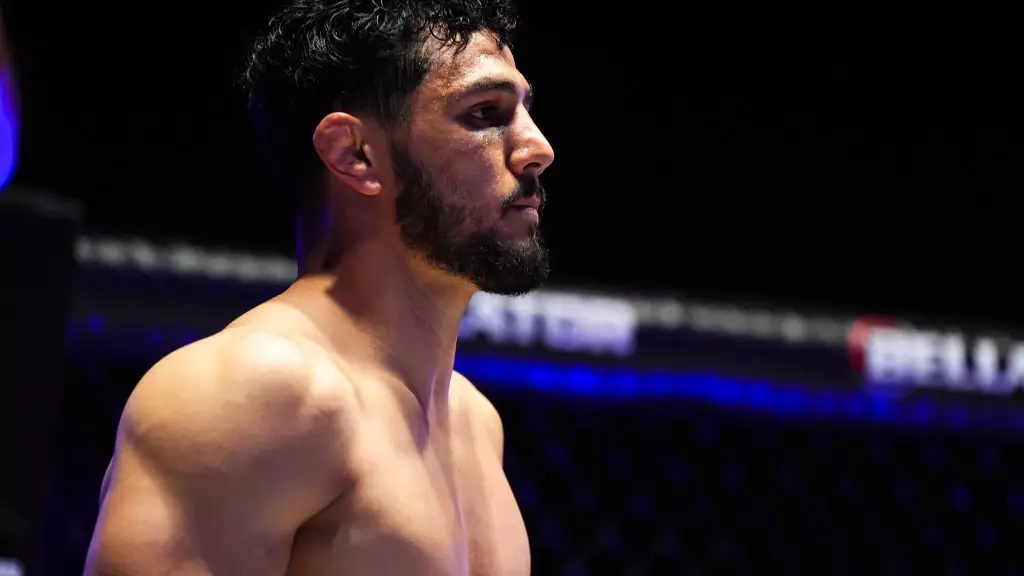The world of mixed martial arts (MMA) is fraught with opportunities and challenges, especially when it comes to contractual obligations that can influence a fighter’s career trajectory. Aaron Pico, an explosive talent in the sport, is currently facing a predicament that has led him to voice his dissatisfaction with his current promotion, the Professional Fighters League (PFL). His aspirations to join the Ultimate Fighting Championship (UFC) appear stymied, not by his skills or the competitive landscape, but by the contractual complexities that have arisen following PFL’s acquisition of Bellator in late 2023.
Pico has not competed since February, and his eagerness to step back into the cage is palpable. With a record of 13 wins and 4 losses, the 28-year-old fighter has built a reputation for himself but finds his ambitions hindered by contractual stipulations that he feels are unjust. Specifically, he has expressed a strong desire to fight for the UFC, widely regarded as the premier organization in MMA, but contends that PFL co-founder Donn Davis is withholding his release and thus preventing his move to the new organization.
During a candid interview, Pico highlighted the frustrations stemming from the “right to match” clause present in his current contract. This clause gives PFL the ability to match any offer he receives from competing promotions, effectively tying him down even as he considers his future. While it is standard practice in the sport, the clause stands out as a significant roadblock for Pico, who articulates a desire for greater challenges and a fresh start.
The root of Pico’s frustration lies not only in his longing to sign with the UFC but also in his experiences with the PFL over the past year. He recounted multiple instances where promises of championship fights fell through. Discussions with Davis on a flight back from Saudi Arabia led him to believe that he would soon be vying for a title in California— a prospect that fueled his optimism and dedication during training.
However, as multiple fight opportunities unraveled, culminating in cancellations without explanation, frustration turned to disillusionment. Pico’s training camps, initially sparked by hopeful prospects, became exercises in waiting; he describes the rollercoaster of potential fights that never materialized, leaving him in limbo. The stark contrast between initial discussions and subsequent outcomes has understandably taken a toll on his trust in the PFL organization.
At the heart of Pico’s grievances is a broader commentary on transparency and communication in the realm of sports management. He articulately expresses a belief that proper communication could alleviate much of the tension and confusion that his situation has engendered. Pico’s frustrations revolve around his perception of a lack of regard for his professional aspirations, emphasizing how vital ongoing communication is in any business partnership—especially within the high-stakes environment of professional sports.
He takes direct aim at Davis, stating that the PFL co-founder has the power to facilitate his release, thus allowing him to explore opportunities where he feels he can thrive. “I’m not asking for anything unreasonable,” he asserts. “I’ve fulfilled my contract; now it’s time for me to move on.” Pico’s reflections remind fans and analysts alike that behind the scenes of their favorite sports figures are real people navigating complex contractual terrains.
Pico’s story is illustrative of larger trends and realities within the combat sports industry. The relationships between fighters and promotions can often become strained due to the business side of the sport—specifically, contracts and obligations that can lead to discontent for fighters who seek to further their careers. Additionally, the power dynamics at play when promotions like the PFL exert control over their fighters underscore a significant aspect of how talent moves—or doesn’t move—within the world of MMA.
Moreover, Pico’s situation raises questions about the balance of power in fighter contracts and the need for greater agency and support for fighters seeking to transition between organizations. As he waits for potential offers from the UFC, the disparity between a fighter’s potential and the obstacles they face illuminates the ongoing struggles for agency within the sport.
Aaron Pico stands at a crossroads, embodying the frustrations, aspirations, and complexities faced by many fighters in MMA. He is an athlete yearning for the competitive challenges that a new organization may bring while grappling with the realities of a business that often prioritizes contracts over individual dreams. As he navigates this difficult phase of his career, the MMA community watches with interest, hopeful that his ambitions will soon be realized.

